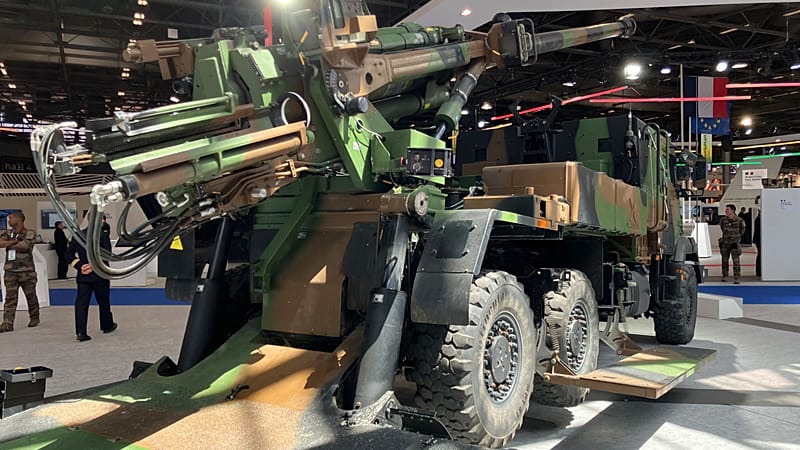Europe’s R&D defence spending surges amid Ukraine war. Which EU country splurges the most?

Research and development (R&D) spending on defence in the European Union has more than doubled over the past five years. It grew from €9 billion in 2020 to an expected €17 billion in 2025, according to the European Defence Agency.
Eurostat data show lower figures due to different methodologies but still indicate a more than 25 per cent increase between 2018 and 2023, the latest available period.
Russia’s invasion of Ukraine has been a key driver behind this surge, experts say.
So, which countries spend the most on defence R&D in Europe? And how has defence R&D spending in the EU changed over the past two decades?
According to EDA’s data, shared with Euronews Next, R&D defence spending in the EU was €7.9 billion in 2005 with 2024 constant prices, which reflects the value of 2005 spending adjusted to 2024 price levels.
It increased significantly in 2024, reaching €13.2 billion, and is expected to rise to €17 billion in 2025 according to EDA estimates.
Russia’s invasion of Ukraine the driving factor
“Russia’s full-scale invasion of Ukraine has been the main driving factor behind the rise in defence expenditure, and consequently in research and development (R&D) spending, across Europe,” Calle Håkansson, a researcher at Swedish Defence Research Agency, told Euronews Next.”
“Although defence investments in Europe had already been increasing over the past decade, the war in Ukraine marked a major turning point”. He added that the new NATO target of 3.5 per cent of GDP for defence spending will further contribute to driving up investment in research and development within the sector.
EDA declined to provide country-level figures, which it said was for “for classification reasons”.
Eurostat publishes country-level data, but its figures are much lower than those from the EDA. However, this is based on 2023 data. Eurostat reported €4.07 billion in 2023, while the EDA put the figure at €11 billion.
Eurostat data still indicates the largest spending.
France and Germany account for three-quarters of EU spending
France has the highest defence R&D spending in the EU. In 2023, it invested €1.6 billion in research and development for its defence industry.
Germany followed closely with €1.4 billion. Together, the two countries spent just over €3 billion (€3.014 billion). France and Germany together account for nearly three-quarters of EU defence R&D spending (74 per cent).
Spain ranks third with €378 million, equal to 9.3 per cent of the EU total. However, US President Donald Trump is unhappy with Spain. “They're the only country that didn't raise their number up to 5%...” he said in October 2025.
“Maybe you should throw them out of NATO, frankly,” he said in another speech.
Trump has repeatedly urged NATO members to boost their own defence spending. Spain was the only one of the 32 member countries that did not commit to raising military spending to 5% of GDP.
The Netherlands and Sweden together around 9 per cent
The Netherlands and Sweden complete the top five. The Netherlands spent €200 million on defence R&D, with Sweden just behind at €176 million. Together, they accounted for 9.2 per cent of the EU total in 2023.
Italy, one of the EU’s “Big Four” economies, does not make the top five. It ranked seventh with €73 million in spending, behind Norway at €136 million.
Six EU countries reported zero spending on defence R&D, while another six spent less than €10 million.
Governments’ different priorities
Rafael Loss, policy fellow at the European Council on Foreign Relations (ECFR) noted that while France and Germany combined in 2023 accounted for 43 per cent of EU defence spending, the two of them represent 75 per cent of EU defence R&D spending.
“To a large extent, that reflects governments’ different priorities for how they spend their defence Euros. Per NATO estimates, for example, Italy and Spain spend greater shares of their defence Euros on personnel than any other ally,” he told Euronews Next.
Loss emphasised that since defence R&D benefits from the civilian innovation ecosystem and vice versa, Germany and France, with their large tertiary-education systems and public funding going into it, are well-positioned to sustain relatively well-functioning, diverse, and innovative defence R&D sectors.
Håkansson pointed out that much of Europe’s most advanced defence industry is concentrated in six countries: France, Germany, the United Kingdom, Italy, Spain, and Sweden.
“Consequently, the most R&D-intensive activities often originate from these states,” he said.
According to EDA’s classification, in 2024, total defence expenditure by the 27 EU Member States reached €343 billion, a 19 per cent increase from 2023, bringing defence spending to 1.9 per cent of GDP.
In 2023, EU countries’ general government expenditure on defence amounted to €227 billion, or 1.3 per cent of GDP, according to Eurostat.
According to EDA’s ‘Defence Data 2024-2025’ report, the upward trend “highlights Member States’ focus on enhancing military capabilities in response to the evolving security environment.
EDA points out that the rise in defence spending, combined with the still limited share of collaborative projects among Member States, creates “a unique opportunity to fully exploit opportunities for collaboration, make use of EU funding possibilities and improve the efficiency of spending and the interoperability of weapon systems across European countries”.
Today

